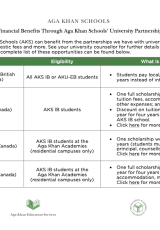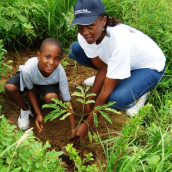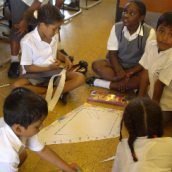Curricular Strands Update
The goal of the Aga Khan Academies is to develop young people who are both locally rooted and globally minded, and who have the capacity to go on and lead in their chosen fields. As part of achieving this vision, the Academies’ curriculum emphasises five areas of study that together comprise the AKA Strands: Ethics, Pluralism, Global Economics, Cultures (including Muslim Cultures), and Governance and Civil Society.
Implementing the Strands
The strands provide direction for all aspects of school life, including policy making, recruitment, curriculum priorities and student life. Within the classroom, the strands are not taught as independent subjects but rather are integrated across the curriculum and help inform the selection of content in all subject areas.
Two of the strands, Ethics and Pluralism, help students develop values and dispositions required by ethical leaders. While students need to understand these areas from a theoretical perspective, this understanding must be transferred into action to be truly meaningful. Students are therefore encouraged to develop their own ethical frameworks and to put them into practice in everyday life. In addition, all Academies staff strive to model the ethical and pluralistic thinking that underpins their work within the school.
The ethic of environmental responsibility becomes concrete through tree planting.The other three strands—Global Economics, Governance and Civil Society, and Cultures—help students learn about ideas that are important to the functioning of societies, and those in the developing world in particular. The recently updated Global Economics Strand, for example, includes a focus on improving quality of life and the economic strategies that can facilitate this.The strands are enriched by the rich resources available within the Aga Khan Development Network (AKDN). Academies educators are working with the International Baccalaureate to develop teaching materials that draw on the experiences of AKDN agencies within the developing world. In addition, the development of the Cultures Strand is particularly enhanced by expertise on the diverse contributions of Muslim societies to global civilization, both now and in the past.
Together, the strands help students engage and grapple with important and difficult issues, and be open to a range of ideas and theories. Students also develop a sense of personal commitment to take responsible action for the betterment of their societies.
Internationalising and Localising the Strands
The process of internationalising the strands and adapting them to local school contexts has begun with the opening of the Aga Khan Academy, Hyderabad. While the strands were initially developed for the first Academy in Mombasa, Kenya, they are designed to be flexible and can be tailored for different cultural environments. The process of internationalising the strands and adapting them to local school contexts has already begun with the opening of the Aga Khan Academy, Hyderabad.
Sharing cultural traditions through the art of henna decoration.In planning for the implementation of the strands, teachers in Hyderabad were asked to consider what students need to understand about the local Indian context. Issues of governance, for instance, are different in India than in Kenya. This thinking process helped inform the selection of content for the curriculum units that are currently being used in the Primary Years Programme.Last term, for example, the Year 3 class studied a unit on the history and geography of Hyderabad as part of the Global Economics Strand. The students examined how the physical features of the area influenced the city’s development and the economic activities that evolved there. They interviewed their parents to learn about employment today and also looked at traditional forms of employment, including a visit to a nearby weaving factory.
More work is being done on the strands for the Middle Years and Diploma Programmes, which will begin in Hyderabad later this year. As further Academies open, the strands will continue to be tailored to local cultures and contexts.
Collaborative Learning Units
At the Aga Khan Academy, Mombasa, the strands are leading to innovative teaching through increased collaboration between departments and disciplines. Recently, teachers in the Humanities and English departments worked together on a Year 7 unit related to the Governance and Civil Society strand.
Junior School students at AKA, Mombasa write messages of peace and non-violence on a kite. In their Humanities class, the students studied authority in various contexts, such as family, school, religious community, tribal group, and nation. They looked at how people or groups attain power and examined how this relates to various forms of governance. Each student reported on a particular leader and, as part of their final assessment, evaluated which authority structures would be best in specific situations.
The students extended their study through their English class by reading the novel The Giver by Lois Lowry, which is set in a seemingly utopian society where people have given up all freedom of choice in favour of security and harmony. The students made connections with what they had learned in Humanities and discussed how much freedom people should give up for the sake of security in real-life situations.
Within both areas students discussed the importance of ‘good governance’ and considered the ethical issues surrounding the responsibility of individuals and groups to take action when this is threatened.
Collaborative teaching units like this allow students to study topics both broadly and in depth, which enhances their learning. Since the strands are woven across all subject areas, they are leading to increased teacher collaboration and enriched learning opportunities for students.
Update on the Global Economics Strand
The strands are developed in close collaboration with both specialists in the relevant areas and Academy teachers. This approach ensures that each strand has a sound intellectual foundation that can be transferred appropriately to the classroom.
Following feedback from His Highness, Academies staff met with academics and development professionals to review and revise the Global Economics Strand, giving it a stronger practical focus. The strand now takes a more concrete look at economics and development, and in particular the question of how to improve quality of life for individuals and societies.
The revised strand highlights different cultural and regional perspectives on economics and encourages students to look for ways of improving quality of life that are appropriate for particular situations. Curricular content for the new framework is now being developed. As the strands continue to evolve, they are leading to deeper and more relevant learning, and the development of a distinct Aga Khan Academies curriculum.
publications







